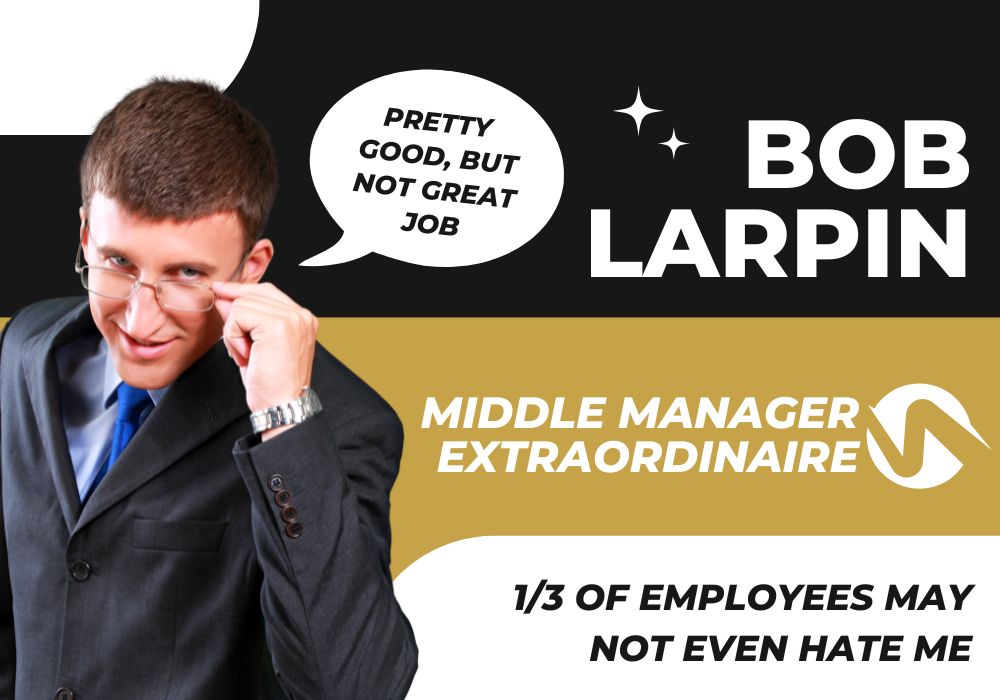(article also featured on LinkedIn)
Middle managers need to be able to motivate, lead, and reward staff, while holding them accountable and getting along with everyone, to be viewed as team players. But what happens when your managers themselves fail?
What kind of toll does this take on your business or company, as a whole?
Key Takeaways:
- Middle managers connect and communicate, bridging the gap between individual workers and upper management
- Middle managers frequently have to perform additional duties like coaching, serving as role models, and developing talent
- According to research, middle managers are the least satisfied workers at American companies and have the highest rates of burnout of all employee types
The essential job of middle managers is to turn executive strategy into tactical reality and make it possible for their teams to be successful. However, inexperienced managers frequently struggle with soft skills like giving appropriate feedback, setting expectations, properly developing their teams, and handling conflict.
When a worker’s relationship with their manager deteriorates, it can have disastrous effects on businesses or at the very least persuade workers to leave. According to a Predictive Index survey conducted in October 2017, 63% of US-based employees who believed their managers were “bad” planned to leave their employers in the coming year.
After “The Great Resignation,” you can imagine it’s even more than that, with many employees now having experienced working remotely and seeing managers and the traditional workplace as unnecessary or obstructive.
The majority of respondents to the 2017 survey believed that poor communication was their manager’s biggest failing.
How much are middle manager problems costing your business?
Many employees’ experiences in a company are greatly influenced by their team and manager. People frequently claim that they leave managers rather than companies. At this time, according to Gallup, 51% of workers are actively looking for a new position.
This presents a serious issue because it can cost anywhere from two to six times an employee’s annual salary to replace them (and because it will probably cost much more to replace a top performer).
If middle managers don’t perform, it will have a significant and worrying effect on the teams they lead and the overall performance of the company, resulting in real monetary and capability losses.
Why Companies (Think They) Need Middle Managers
Middle managers have long acted as human switches, keeping track of projects’ progress, transferring data between teams, and acting as a liaison between junior staff members and senior executives.
This communication is more difficult than ever when working remotely, but the best management strategies have changed. Managers should find digital tools that can automate and supplement human efforts rather than manually routing information.
In our research, “time spent tracking others’ workloads” was one of the top stressors mentioned. If managers use tools designed for tracking remote and hybrid workforces and then concentrate their own energy on creating teams and developing talent, they will be more productive and less stressed.
What makes a good middle manager?
Middle management focuses on interactions with employees and the daily operations of a particular site, office, or department within the company, while top management concentrates on overall strategy and long-term planning for the company.
A good middle manager needs to possess a variety of skills, including leadership, interpersonal, communication, and delegation abilities. Since middle managers are the ones who must deal with urgent situations and unanticipated emergencies, flexibility is also crucial.
An effective middle manager can communicate with staff members on a one-on-one basis with the aid of facilitation skills like conflict resolution and improve employee motivation.
Typical job responsibilities of middle level managers:
- Establishing and carrying out daily procedures for a particular office, branch, or department
- Keeping an eye on employee performance, assigning and managing particular work tasks, and ensuring that practices and procedures adhere to the overall organization’s guidelines
- Motivating staff members to give their best effort generating suggestions to increase productivity at a particular workplace or in a particular department
- Hiring and retaining hourly or salaried staff
- Interpreting top-level management’s strategy and putting it into practice
- Managing resource allocation within a branch, office, or division
- Reporting problems and performance to higher-ups in management
Middle managers’ typical responsibilities and tasks consist of dealing with common problems that arise at a particular business location or in a particular department within the company.
Middle Management Problems and Solutions
Many middle managers were promoted from within because they were good at their own jobs and went above and beyond. Suddenly, their job becomes planning everyone’s work and delegating tasks to accomplish the bigger picture.
Middle managers often require more experience and leadership when dealing with people, rather than simply being a taskmaster. Oftentimes, middle managers find themselves in over their heads regarding the human connection and inspiring others to follow their lead.
As a result, companies and middle managers overcompensate.
Too Many Middle Managers
In a wide range of sectors, a disproportionate amount of management staff is more concerned with assigning blame and taking credit than with effectively managing people, with disastrous results. The middle manager that siphons their employees’ work and diminishes it, all while taking credit for it is a quick way to turn off your talent.
The most successful modern businesses will prevail in the talent war by investing in and empowering their current workforce to generate long-term value for the business rather than just hiring top talent from outside.
A great manager (like a great coach) has the ability to take an average employee and turn them into a star. It takes getting used to seeing the young as early-stage investments with the potential to develop into something extremely valuable rather than as employees who must be tolerated until they are good.
Middle Manager Burnout
Middle managers report being burned out at work more than other groups, including executives and individuals. Almost one in five middle managers report having experienced depression, more than anyone else at work too.
Since burnout is closely linked to a poor employee experience, a lack of connection, and higher attrition, executives should take note of these findings:
- Compared to employees who are not burned out, burned out workers report 22 times more stress and anxiety at work.
- Burnout is closely linked to decreased employee performance, including a 32% decrease in productivity and a 60% decrease in concentration.
- Those who have been burned out feel much less connected to work. People are 2x more likely to feel disconnected from the company’s values, direct managers, immediate team, and executive leadership.
- Burned-out individuals report being three times as “likely” or “very likely” to look for a new job in the upcoming year.
- Burnout was reported highest in the U.S. in 2022 and continues to be one of the biggest problems facing business owners.
Burnout comes at a price, but it doesn’t stop there.
A Toxic Company Culture and Quiet-Quitting
Middle managers are often very specialized and proficient in some things but are not great leaders. Employees start to lose faith in work processes when recurring problems are not addressed and responsibility is shirked in a collective effort to save face.
When people are afraid to ask questions or point out obvious mistakes, this can result in a toxic work culture encouraged by a middle manager that ultimately hurts your business. When middle managers play favorites or reward passivity, they reinforce the status quo, even when it’s not in everyone’s best long-term interest.
People will often “quietly quit,” meaning they will do the bare minimum to get by and stay out of trouble, which results in a massive loss of productivity and missed opportunity for improving and refining existing work procedures.
Middle managers may sometimes be skeptical of new talent if they perceive them as a potential threat or too ambitious for the status quo.
When employees figure out how things really work, supervisors may begin emulating the negative management styles they see directly above them. A sign of this is manifest in lower-level supervisors when they act in an arbitrary, authoritative way.
When pageantry and posturing become more important than producing quality work, it’s only a matter of time until all the competence, innovation and creativity are hollowed out of your company altogether.
Why Your Company’s Middle Managers Might Be Suffering in Silence
Many things contribute to a middle manager’s frustration:
- Too many meetings
- Overloaded with administrative duties
- Feeling stuck in the middle with no allies
- Feeling undervalued
- Not trained for the position
Addressing and automating the workload, task planning and management, monitoring employee progress and workflow with a software program or system like Gusto, Asana or Connecteam can free up time for middle management for bigger brain activities.
Providing career training for leadership development can also reduce the training deficit and increased emotional burden on middle managers.
Conclusion: Are Middle Managers Making Your Company Better or Worse?
These days, managers are already being liberated from mundane tasks such as form processing, data analysis, document management, and workflow approvals, as a result of automation.
Fewer meetings give managers—who probably attend more meetings than individual contributors—more time to concentrate on strategic team goals and initiatives, which may help lessen burnout. With training from the executive team, they can learn how to listen more to employees as well.
Employees can feel comfortable introducing new ideas that are developed, screened, and, if worthwhile, brought to the attention of senior leaders by middle managers who give them the time and encouragement they need to innovate.
But middle managers often like to be perceived as the foremost subject matter experts and most valuable personnel in the office to maintain a posture of being in charge, so the real question is, will they?
Frequently Asked Questions – Middle Level Management
Middle managers are a crucial component of any company. They frequently serve as the intermediary between senior management and front-line employees. They serve as a buffer by ensuring that daily operations go without a hitch. To remain competitive in the market of today, it is critical to comprehend the advantages of middle management.
According to research, managers have the biggest impact on an employee’s experience. Since you set the tone for the rest of your team, everyone will pick up on your emotions. Your entire team will suffer if you’re demotivated, burned out, and unhappy. However, if you’re feeling motivated, effective, and content, your team may benefit as well. According to research, managers have the biggest impact on an employee’s experience. Every manager has a contagious effect on the surrounding area.
A good boss communicates a clear and unifying vision, sets expectations, makes themselves available to employees, is mission-oriented, and doesn’t play favorites or hold double-standards for different personnel. Good bosses and managers praise in public and private, compensate and acknowledge when workers go above and beyond, and never gaslight or deceive their subordinates just to appear like they’re the boss.
- A Better Way to Invest in Crypto: Intermediate Strategies that Remove All the Emotion and Stress - November 1, 2024
- America’s Payday Loan and Same-Day Paycheck Practices Hint at a Darker Norm - October 5, 2024
- America’s Food Processing Woes Continue With Listeria Outbreak, Lead, Arsenic, and Plastic Contamination - September 23, 2024



Pingback: Executive Leadership: PMO and Team Strategies That Work - Upwardpreneur